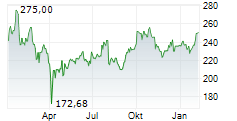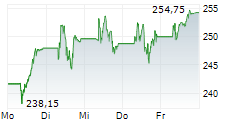
NORTHAMPTON, MA / ACCESSWIRE / October 23, 2024 / Schneider Electric:
By Manish Pant

Schneider Electric
The United Nations Conference of Parties dedicated to biodiversity, also known as COP16, will begin in Cali, Colombia. Its aim is assessing the progress made by countries toward national action plans and advancing resource mobilization for a just transition.
Humans have an umbilical relationship with nature. It's now critical, for our species and many others, to rebalance this relationship. I believe corporations - who often bear the heaviest environmental impact - must become role models in protecting the planet and its biodiversity for generations to come.
Strength in biodiversity
Biodiversity encompasses all life on Earth, including plants, animals, bacteria, fungi, and humans. This forms an interconnected web of ecosystems and genetic diversity - and the backbone of our planet's health. Here's why it's so crucial:
Ecosystem stability: Diverse ecosystems are more resilient to disturbances like extreme weather events and diseases. Each species plays a unique role, contributing to the overall health and stability of the environment.
Food security: A variety of crops and livestock ensures a stable food supply for humanity. Diverse plant species also contribute to soil health, reducing the need for chemical fertilizers.
Medicinal resources: Many medicines are derived from plants and animals. Protecting biodiversity means preserving potential future medical discoveries.
Economic value: Biodiversity directly supports industries like agriculture, fisheries, and tourism - but also all economic activities based on natural capital, contributing trillions of dollars to the global economy.
Cultural value: Nature has inspired countless works of art, literature, and traditions. Biodiversity enriches our lives in ways that go beyond the material, sustaining the spirit of civilization.
The threat of climate change
The effects of human-made climate change, like rising temperatures, changing precipitation patterns, and more frequent extreme weather events, pose a sweeping threat to biodiversity. It disrupts habitats, forcing species to adapt, migrate, or face extinction. Take coral reefs, home to 25% of all marine life, which are dying due to warmer waters and ocean acidification. As species disappear, the delicate balance of ecosystems is thrown off, creating domino effects throughout the food chain.
Human activities are damaging biodiversity directly too. Deforestation, agriculture, urbanization, overexploitation of resources, and introduction of invasive species all contribute to the destruction of natural habitats. We produce vast amounts of waste in the form of chemicals and plastics, which contaminate the land, ocean, and air. The grim result is that humans, as a single species, are directly responsible for a planetary extinction event, known as the Holocene extinction.
However, experts say this can be halted by conserving 1.22% of Earth's surface. With this hopeful statistic in mind, we must act immediately. But how?
Large business, large responsibility
As businesses, we have an obvious impact on the planet. We extract resources while generating waste and pollution. This hands us a moral duty to minimize the environmental effects of our operations. It's also a matter of reputation, as investors and customers become more eco-conscious.
Biodiversity loss leads to operational risks like resource scarcity and supply chain disruptions. By investing in conservation, companies can help safeguard their resources - ensuring resilience and future prosperity. Finally, sustainable practices can lead to innovations and new business opportunities, such as developing cleaner technologies.
But to reduce and minimize their impact, businesses must first understand their impact. They should then implement concrete action plans, while measuring and reporting on progress. Our Sustainability Research Institute offers a blueprint for corporate biodiversity action.
In addition, businesses must use their influence to encourage policymakers to create a legal and financial framework that incentivizes biodiversity action. This is already happening in international negotiation arenas such as COP16, as well as the Business for Nature coalition we joined with 180 companies worldwide, calling to reverse nature loss this decade.
At Schneider Electric, we're proud to play our part, starting with measurement. Our Biodiversity Footprint Assessment revealed that 70% of our impact is linked to greenhouse gas emissions; the second factor is related to land use for woods and metals. We took action by pledging voluntary commitments to preserve and restore biodiversity:
Achieving zero net loss biodiversity in direct operations by 2030
Deploying biodiversity conservation and restoration programs at nearly 400 sites by 2025
Sourcing 100% deforestation-free wood by 2030
Educating all our employees by accelerating our corporate biodiversity training
As part of our Sustainability Impact program, we're also implementing sustainable solutions and circular practices to optimize the use of resources over their entire lifecycle - relieving the pressure on resources and bringing indirect benefits to biodiversity. We partner with suppliers to eliminate single-use plastics from packaging and use recycled cardboard only, helping them to sharply reduce their CO2 emissions.
When it comes to direct biodiversity action, we engage our employees, alongside NGOs and investment funds, on local initiatives. For example, we ensure that all our sites deploy biodiversity conservation and restoration programs aimed at long-lasting impact - and that sites in water-stressed areas enact water conservation plans. By the end of last year, 66% and 73% of our sites reached these goals respectively.
Ground-level action for nature and people
In collaboration with NGO Very Nile in Egypt, we organize Nile clean-up events that engage our employees and educate them about pollution and its effects on biodiversity. We facilitate the collection and recycling of waste, with the resulting product sold to raise money for the local community. The NGO also guarantees fair wages and social services for the local fishermen and women that collect plastic, creating sustainable livelihoods while helping the planet.
Schneider Electric's global footprint lets us cater to diverse needs. Our wildlife preservation initiative in East Africa, with Sheldrick Wildlife Trust and Kenya Wildlife Service, protects an endangered species of elephant, as well as their natural environment. Our employees have "adopted" three orphaned baby elephants in Nairobi National Park, with the company covering the costs of meals, medical treatment, and ranger fees to protect from poachers.
We believe firmly in collective engagement, and that biodiversity education should start from an early age. That's why in India, employees from our Ahmednagar site joined forces with local pupils to build birdhouses and insect hostels, as well as plant over 3,000 saplings on factory premises, at their own homes, and in school areas. Flora like this provides the ecosystem base for birds and other insects, which will increase the fauna population in turn.
Biodiversity is part of Earth's life support system. Its protection isn't just an environmental issue, but an economic, social, and ethical imperative. By raising awareness of its importance and addressing the threats of climate change, we can actively shape a more sustainable future. Here, corporations must be on the front line, using their vast resources and footprint to drive substantial change.
View additional multimedia and more ESG storytelling from Schneider Electric on 3blmedia.com.
Contact Info:
Spokesperson: Schneider Electric
Website: https://www.3blmedia.com/profiles/schneider-electric
Email: info@3blmedia.com
SOURCE: Schneider Electric
View the original press release on accesswire.com



